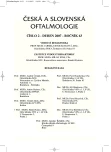The Cooperation between the Ophthalmologist and the Endocrinologist in the Treatment of the Endocrine Orbitopathy
Spolupráca oftalmológa a endokrinológa pri liečbe endokrinnej orbitopatie
Autori vo svojej práci zdôrazňujú potrebu spolupráce oftalmológa a endokrinológa pri diagnostike a liečbe stredne ťažkých a ťažkých foriem endokrinnej orbitopatie (EO). Uvádzajú vyšetrenia potrebné k diagnostike ochorenia a možnosti celkovej liečby. Zo súboru 70 pacientov s endokrinnou orbitopatiou sledovali 20 pacientov s ťažkou formou ochorenia, ktorí podstúpili rôzne kombinácie kortikoidnej terapie, imunosupresívnej terapie, rádioterapie (RA) a dekompresie orbít. Autori odporúčajú dávku Methylprednisolonu (7–9 g ) rozdelenú do pulzných dávok po 1000mg a následne po 500 mg podaných v priebehu 3–4 týždňov (2–3 infúzie v týždni). Prednison odporúčajú podať v dávkach 60–90 mg/deň, v závislosti od váhy pacienta. Po úvodnej každodennej maximálnej dávke v trvaní do 2 týždňov doporučujú postupne znižovať dávky s trvaním liečby minimálne pol roka. Zníženie centrálnej ostrosti zraku (COZ) v závislosti od EO bolo u 7 pacientov. Stabilizovať sa ju podarilo u 6 pacientov po liečbe EO. Pohyb ruky pred okom zostal u 1 pacienta s ťažkou neuropatiou optiku aj napriek urgentnej dekompresii. U 16 pacientov sa podarilo po liečbe EO stabilizovať vnútroočný tlak (6 pacienti nevyžadujú liečbu antiglaukomatikami). K zlepšeniu protrúzie bulbov došlo u 8 pacientov (1–5mm ) po kortikosteroidnej terapii a u 5 pacientov po dekompresii očníc (6–10mm). U 3 pacientov po opakovaných pulzoch kortikoterapie sa vyskytli závažné nežiadúce účinky (herpetická infekcia, steroidný DM, osteoporóza). Autori odporúčajú včasné nasadenie intenzívnej kortikoidnej liečby v aktívnom štádiu stredne ťažkých foriem endokrinnej orbitopatie.
Kľúčové slová:
Graves-Basedowová choroba, endokrinná orbitopatia
Authors:
S. Ferková 1; M. Chynoranský 1; J. Podoba 2; J. Čmelo 3
Authors‘ workplace:
Klinika oftalmológie LFUK, Bratislava
prednosta prof. MUDr. Peter Strmeň, CSc.
1; Subkatedra endokrinológie a metabol. chorôb SZU, Bratislava
vedúci doc. MUDr. Ján Podoba, CSc.
2; Neštátna neurooftalmologická ambulancia, Bratislava
3
Published in:
Čes. a slov. Oftal., 63, 2007, No. 2, p. 108-116
Overview
Authors of this study emphasize the requirement of the cooperation between the ophthalmologist and the endocrinologist in diagnostics and treatment of moderate and severe forms of endocrine orbitopathy (EO). Examinations necessary for diagnosis and possibilities of the systemic treatment are reported. Twenty patients within the group of 70 patients with EO, who had severe form of disease and underwent different combinations of corticosteroid therapy, immunosuppressive therapy, radiotherapy (RA) and orbital decompression were followed up. Authors recommend a dosage of Methylprednisolon (7–9 g) divided into pulses of 1000mg followed by pulses of 500mg given during 3 to 4 weeks (2–3 infusions per week). They recommend administering Prednison in 60–90 mg doses per day depending on weight of a patient. After daily maximum dose during the first two weeks, the authors recommend to decrease gradually the dose with the total treating period of minimum of a half a year. Decrease of visual acuity depending on EO appeared by 7 patients. It has been stabilized in 6 patients after the treatment of EO. Hand movement remained in one patient with severe neuropathy in spite of urgent orbital decompression. The intraocular pressure has been stabilized in 16 patients after treatment of EO (six patients do not require further antiglaucomatic therapy). The decrease of protrusion occurred in 8 patients after corticosteroid therapy (1–5 mm) and in 5 patients after orbital decompression (6–10 mm). Severe adverse events (herpetic infection, osteoporosis, steroid DM) were reported in 3 patients after repeated courses of corticosteroid therapy. Authors recommend early administration of intensive systemic corticosteroid therapy in active stage of the moderate forms of EO.
Key words:
Graves-Basedow disease, endocrine orbitopathy
Labels
OphthalmologyArticle was published in
Czech and Slovak Ophthalmology

2007 Issue 2
-
All articles in this issue
- Control of the Rabbit’s IOP after Topic Instillation of Antiglaucomatic Latanoprost and Amino Acid Arginine with Lysine Mixture
- The Use of the Toric Intraocular Lens in Treatment of Complicated Cataract and High Degree Astigmatism
- Intraoperative Floppy Iris Syndrome
- Functional Examination of Retinal Vessels in Patients with Central Retinal Vein Occlusion
- The Influence of LASIK to the Retinal Nerve Fiber Layer in Myopia
- The Cooperation between the Ophthalmologist and the Endocrinologist in the Treatment of the Endocrine Orbitopathy
- Orbital Apex Syndrome of the Aspergilus Ethiology – a Case Report
- Czech and Slovak Ophthalmology
- Journal archive
- Current issue
- About the journal
Most read in this issue
- Intraoperative Floppy Iris Syndrome
- Orbital Apex Syndrome of the Aspergilus Ethiology – a Case Report
- The Cooperation between the Ophthalmologist and the Endocrinologist in the Treatment of the Endocrine Orbitopathy
- Functional Examination of Retinal Vessels in Patients with Central Retinal Vein Occlusion
